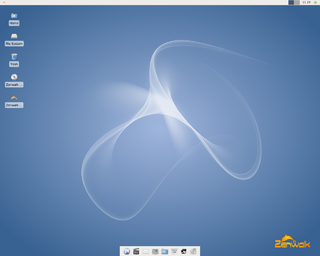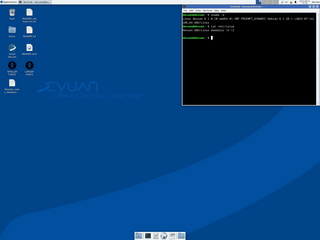
A Linux distribution is an operating system made from a software collection that includes the Linux kernel and often a package management system. They are often obtained from the website of each distribution, which are available for a wide variety of systems ranging from embedded devices and personal computers to servers and powerful supercomputers.

Source Mage is a source-based Linux distribution descended from Sorcerer. Components of this operating system are downloaded as source code and compiled locally on the user's computer.

Dillo is a minimalistic web browser particularly intended for older or slower computers and embedded systems. It supports only plain HTML/XHTML and images over HTTP and HTTPS; scripting is ignored entirely. Current versions of Dillo can run on Linux, BSD, OS X, IRIX and Cygwin. Due to its small size, it was the browser of choice in several space-conscious Linux distributions. Dillo is free software, released under the GNU GPL-3.0-or-later.

Damn Small Linux (DSL) is a computer operating system for the x86 family of personal computers. It is free and open-source software under the terms of the GNU GPL and other free and open-source licenses. It was designed to run graphical user interface applications on older PC hardware, for example, machines with 486 and early Pentium microprocessors and very little random-access memory (RAM). DSL is a live CD with a size of 50 megabytes (MB). What originally began as an experiment to see how much software could fit in 50 MB eventually became a full Linux distribution. It can be installed on storage media with small capacities, like bootable business cards, USB flash drives, various memory cards, and Zip drives.

Arch Linux is an independently developed x86-64 general-purpose Linux distribution that strives to provide the latest stable versions of most software by following a rolling-release model. The default installation is intentionally minimal so that users can add only the packages they require.

The Federal University of Rio Grande is a public Brazilian university funded by the Brazilian federal government, located in the city of Rio Grande, Rio Grande do Sul, Brazil.
Technical variations of Linux distributions include support for different hardware devices and systems or software package configurations. Organizational differences may be motivated by historical reasons. Other criteria include security, including how quickly security upgrades are available; ease of package management; and number of packages available.

Scientific Linux (SL) is a discontinued Linux distribution produced by Fermilab, CERN, DESY and by ETH Zurich. It is a free and open-source operating system based on Red Hat Enterprise Linux.

TrueOS is a discontinued Unix-like, server-oriented operating system built upon the most recent releases of FreeBSD-CURRENT.

Zenwalk GNU/Linux is a desktop-focused Linux distribution founded by Jean-Philippe Guillemin. It is based on Slackware with very few modifications at system level making it 100% compatible with Slackware. It aims to be a modern, multi-purpose Linux distribution by focusing on internet applications, multimedia and programming tools. It comes with many specialized tools and is designed for beginners and advanced users alike, as it offers system configuration via both graphical tools and the command line.

Pardus is a Linux distribution developed with support from the government of Turkey. Pardus' main focus is office-related work including use in Turkish government agencies. Despite that, Pardus ships in several languages. Its ease of use and availability free of charge has spawned numerous communities throughout the world.

gNewSense was a Linux distribution, active from 2006 to 2016. It was based on Debian, and developed with sponsorship from the Free Software Foundation. Its goal was user-friendliness, but with all proprietary and non-free software removed. The Free Software Foundation considered gNewSense to be composed entirely of free software.

SliTaz GNU/Linux is a lightweight Linux distribution, community-based, suitable for use on older hardware and as a Live CD or Live USB. SliTaz stands for "Simple, Light, Incredible, Temporary Autonomous Zone" according to the boot screen.
Parsix GNU/Linux was a live-CD Linux distribution based on Debian. The Parsix project's goal was to provide a ready-to-use, easy-to-install, desktop and laptop-optimized operating system based on Debian's testing branch and the latest stable release of GNOME. It was possible to install extra software packages from the project's own APT repositories.

Tiny Core Linux (TCL) is a minimal Linux kernel based operating system focusing on providing a base system using BusyBox and FLTK. It was developed by Robert Shingledecker, who was previously the lead developer of Damn Small Linux. The distribution is notable for its small size and minimalism; additional functions are provided by extensions. Tiny Core Linux is free and open-source software licensed under the GNU General Public License version 2.

Chakra was a Linux distribution originally based on Arch Linux and focused on KDE software, intending to provide a KDE/Qt minimizing use of other widget toolkits where possible. It was well received by critics during its existence.

Qubes OS is a security-focused desktop operating system that aims to provide security through isolation. Isolation is provided through the use of virtualization technology. This allows the segmentation of applications into secure virtual machines called qubes. Virtualization services in Qubes OS are provided by the Xen hypervisor.

Emmabuntüs is a Linux distribution derived from Debian and designed to facilitate the restoration of computers donated to humanitarian organizations like the Emmaüs Communities.

Devuan is a fork of the Debian Linux distribution that uses sysvinit, runit or OpenRC instead of systemd. Devuan aims to avoid "lock-in" by projects like systemd and aims to maintain compatibility with other init systems to avoid detaching Linux from other Unix systems.

















